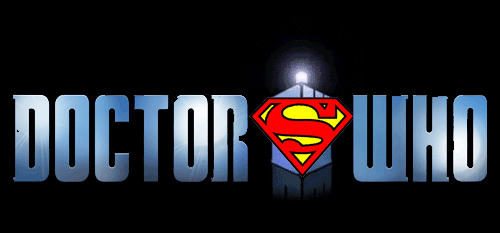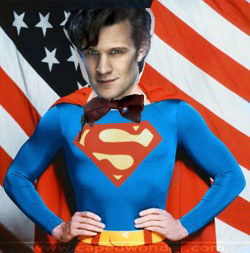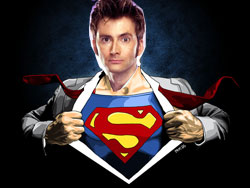The last survivor of an extinct intelligent alien race arrives on Earth and almost immediately finds himself enamored of the endlessly complex, less-evolved-but-still-so-admirably-hopeful denizens of the planet, and vows to dedicate his life to protecting them, allowing them to thrive and finally live up to their true potential as a species. Wait, who was I talking about again? Oh yeah, Superman…right? Or—wait, no, The Doctor? No, definitely Superman. I think. Man, I could have sworn that it was The Doctor…
But really, what’s the difference?

Sure, one wears a bowtie (or a scarf, or…) and the other wears a cape, but other than that, Kal-El and The Doctor are remarkably similar characters (and no, I’m not just saying that because all humanoid aliens look the same). Superman is the last son of Krypton, The Doctor is the last of the Time Lords; Superman has a human pal in Jimmy Olsen, The Doctor has legions of human companions (though usually one at a time); Superman gains his powers from Earth’s yellow sun, and the Doctor gains his from a sonic screwdriver; Superman regenerated after being killed by Doomsday, and the Doctor regenerates all the time following some kind of “death,” symbolic or otherwise.
 Which other popular character does these things? Jesus, of course. Now bear with me here. I’m not trying to get all preachy or anything; I’m simply using this comparison in terms of literary value. The Bible is the “greatest story,” after all, and its influence on the Western literary canon is undeniable. In fact, this archetype of a lone savior sent from another place stretches back even further. One could even argue that the Greek Heracles fills this same role, being a character that is more than human but was raised by/lives among the people, his adopted family, with whom he never quite fits. But he still cares enough to become their champion. And let’s not forget that Heracles also journeyed through Hades and emerged triumphant.
Which other popular character does these things? Jesus, of course. Now bear with me here. I’m not trying to get all preachy or anything; I’m simply using this comparison in terms of literary value. The Bible is the “greatest story,” after all, and its influence on the Western literary canon is undeniable. In fact, this archetype of a lone savior sent from another place stretches back even further. One could even argue that the Greek Heracles fills this same role, being a character that is more than human but was raised by/lives among the people, his adopted family, with whom he never quite fits. But he still cares enough to become their champion. And let’s not forget that Heracles also journeyed through Hades and emerged triumphant.
Back to our focal folk heroes, one who flies around in a blue suit and the other in a blue box. (Which, have you noticed the similarities between the inside of the TARDIS and the inside of the Fortress of Solitude?) Both of these characters are even iconic enough to be recognized by those outside of the traditional fandom (read: people who read/write articles like this). And while both have a proven staying power and longevity, they’ve each gone through significant changes throughout their respective careers across mediums. They’ve both transcended beyond their origins as TV shows and comic books, respectively, and evolved into movies, radio plays, and general symbols of the cultural zeitgeist. Their stories have transcended their own continuities, sometimes even within the context of their own stories (with the help of a Pandorica, or a hole punched in reality, for example). The Doctor, of course, has regenerated ten different times now, with each new iteration presenting a different appearance, new quirks, and a slightly altered personality. He has transformed from a wise old man to a battle-hardened veteran to a raggedy man and more. Superman, on the other hand, began his heroic career as a “Champion of the Oppressed,” and has gone on to be an Anti-Communist Crusader, a Government Stooge, and at one point even a punk rock teenager, black construction worker, homicidal cyborg, and weird alien genetic protector thing all at the same time (we don’t really talk about that).
 But regardless of these many changes, both Superman and The Doctor have remained the same at their cores. Both of them are champions from another world, and we look to them to make things better. We’re not supposed to empathize or relate to their struggles; we have Spider-Man and Luke Skywalker and other characters for that. Instead we look up to them, and aspire to their greatness and irrepressible altruism. Of course, we’ll never quite live up to their level. They might look human, after all, but we all know they’re both something else, something innately greater than us, whose level we will never quite reach—which some people might consider problematic (*cough*Lex Luthor*cough*) or simply arrogant (*cough*Every Steven Moffat Maxi Plot So Far*cough*). But we continue to try, because despite their abilities, these two extraterrestrial demigods look up to us as well. We admire their powers, while they in turn admire our hearts (or double-hearts, as the case may be). Neither Superman nor The Doctor views himself as being superior to us in any way; in fact, it’s likely that either one would trade his powers for a chance at being human.
But regardless of these many changes, both Superman and The Doctor have remained the same at their cores. Both of them are champions from another world, and we look to them to make things better. We’re not supposed to empathize or relate to their struggles; we have Spider-Man and Luke Skywalker and other characters for that. Instead we look up to them, and aspire to their greatness and irrepressible altruism. Of course, we’ll never quite live up to their level. They might look human, after all, but we all know they’re both something else, something innately greater than us, whose level we will never quite reach—which some people might consider problematic (*cough*Lex Luthor*cough*) or simply arrogant (*cough*Every Steven Moffat Maxi Plot So Far*cough*). But we continue to try, because despite their abilities, these two extraterrestrial demigods look up to us as well. We admire their powers, while they in turn admire our hearts (or double-hearts, as the case may be). Neither Superman nor The Doctor views himself as being superior to us in any way; in fact, it’s likely that either one would trade his powers for a chance at being human.

In the meantime, we look to Superman and The Doctor to guide and protect us, just as we looked to their archetypal forefathers for the same. And who knows, maybe the Doctor’s 13th and final regeneration will have a penchant for blue spandex and some little red underwear on the outside of his pants. He’s had stranger quirks before.
Thom Dunn is a Boston-based writer, musician, homebrewer, and new media artist. He enjoys Oxford commas, metaphysics, and romantic clichés (especially when they involve robots). He firmly believes that Journey’s “Don’t Stop Believing” is the single worst atrocity committed against mankind. Find out more at thomdunn.net.











No, they’re not.
I understand being a big fan a particular thing one likes. But Dr. Who fans take things waaaaay too far.
I’m not convinced they’re at all the same character. Both Superman and The Doctor share a moral core, but they apply it in vastly different ways. The Doctor often manipulates people into changing circumstances for him (or themselves); rather than standing in harm’s way, he places people in front of him. Those people almost always want to do that, but that just continues to underline the difference between the Doctor and Superman. They both inspire awe and devotion, but they use it differently.
They also represent different forces to an outside observer. If the Doctor shows up, more often than not that means a fundamental change in your world is coming. If Superman shows up, more often than not that means the only force strong enough to preserver or restore the status quo has arrived. The Doctor is a harbinger of change, Superman is a response to it. The Doctor catalyzes, Superman shepherds.
Although… both of them are very keen on providing humanity with the tools that will allow them to help themselves. So in that sense they’re fairly alike.
There are some pretty fundamental differences between the two. The Doctor, for all his affection for humanity, is still an alien; he spent his formative centuries living on Gallifrey, socialized as a member of that civilization, and eventually grew disillusioned with it and chose to leave. He was a voluntary exile from his people for a long time, but eventually renewed contact with them on what became an increasingly regular basis. The destruction of his world, for all its fundamental importance to the revival series, is a very recent event in terms of his (and to a lesser extent, the franchise’s) total lifespan. Gallifrey was the only home he’d ever known besides the TARDIS, and even though he was a rebel from his people, losing it changed him, making him feel lost. He still hangs around with humans, but exists outside of their world, unable to experience everyday human life or fit into our society because his basic mindset is alien to ours and vice-versa. All he knows how to be is the Doctor, the alien wanderer who saves people; for all his changes of form and manner, it’s the only identity he has.
Kal-El, on the other hand, lost his homeworld as an infant. He grew up on Earth thinking of himself as a human being; in most modern versions of the continuity, he didn’t even know about his Kryptonian origins until he was a teen or an adult. He considers his home to be Earth (and particularly Smallville and Metropolis), not Krypton, and he identifies with humanity. He has no trouble leading a normal, everyday human life, because he’s spent a lifetime doing it. He keeps the alien and heroic aspects of his life segregated within an alternate identity so that he can carry on being the person he’s always been, Clark Kent. The Fortress of Solitude is a refuge for him, a place to exercise that side of his heritage when he’s not saving lives, but it’s not his home, more just his clubhouse.
Another major difference: Superman has tons of superpowers to help him save the day. He’s your archetypal Flying Brick character. But what’s distinctive about the Doctor as a hero is that — aside from the occasional special abilities like regeneration, respiratory bypass, a dual circulatory system, and inconsistently applied telepathy — his principal superpower is that he’s clever. He saves the day because he knows stuff nobody else knows, and because he can explain things to people and tell them what they need to do. Sure, his sonic screwdriver has a whole passel of powers, but that’s presumably because of the Doctor’s own inventiveness; originally it was just for driving screws, but the more he’s tinkered with it over the years, the more versatile it’s become. Even in his more physically daring incarnations (mostly the Third), he still prevails mainly through his wits. Superman, when well-written, can be quite ingenious, but still relies on his physical powers for the most part. Superman is a jock hero; the Doctor is a nerd hero. (Which fits into the insider/outsider dichotomy from before.)
One of the few things they do have in common is a reverence for life; in principle, they both reject killing as a solution. But the glaring difference is that Superman is actually able to live up to that ideal — the Doctor, very rarely.
Whatever else they have in common is mostly just stuff you could say about many heroes. So no, I don’t think it works to equate them — not even remotely.
While there are some parallels between the two, I think there are more differences than similarities. Doctor Who comes in and knows what levers to push to make things happen. Supes doesn’t need to do that–he is the freakin’ lever–when you can lift mountains, you don’t need to spend much of your adventures sneaking around or running from bad guys.
I think the deeper you go the less true it is, but on a structural level– these are both demigods who need appropriate challenges, often ethical, mental or social ones– is true.
@6: Maybe so, but as I said, that’s something that can be said about plenty of heroic characters in fiction, so it doesn’t really show any special similarity between these two in particular.
@@.-@: I was going to say all this, but you already said it, and much better than I could have. :) They are really not much like each other at all, except in the fact that they were both born on other planets than Earth. There the similarities end. The comparison, though fun to contemplate, is so far-fetched that it’s silly.
So, @1 — don’t blame this on being a Who fan. I’m a huge Who fan, and I don’t see this any more than you do.
I just watched the episode of SMALLVILLE (about Clark Kent’s teen-years on Earth) entitled “Rosetta,” where Christopher Reeve made his initial guest-star spot as a ‘doctor’ who had been studying the encrypted radio-message that accompanied Kal-El’s ‘descent to Earth:’ The message went “This is Kal-El of Krypton, our infant son, our last hope. Please protect him and deliver him from evil. (Though ‘the words that came out of Reeve’s mouth’ were more like ‘Deliver him … evil’ … then–after a commercial-break–the message continued) We will be with you, Kal-El, for all the days of your life. ”
And then Clark finds a message hidden inside the pod that brought him: On this third planet from this star Sol, you’ll be a god among men. They are a flawed race. Rule them with strength, my son. That is where your greatness lies.
Maybe The Doctor was his own Jor-El to his own Kal-El! Who’s to Say?